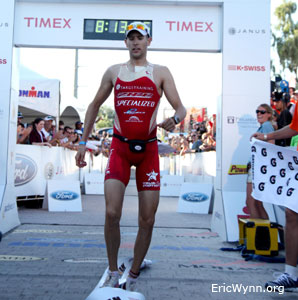The Education of Jordan Rapp
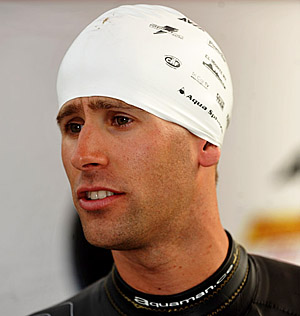
Triathlon was born as a sport which married not just three sports – swimming, biking and running – but also attracted passionate devotees of another triad – physiology, technology and technique. Triathlon was for adventurous, curious outliers who fearlessly explored the limits of sport and science. Simply put, it was a glorious home for athletic, disciplined nerds with a high pain threshold and an insatiable curiosity about their limits. It was meant for thinkers and tinkerers with a will to power and the endurance to use it.
Enter Jordan Rapp. After studying aerospace and mechanical engineering at Princeton University, he only came to truly enjoy his academic specialty as it applied to his late-blooming interest in triathlon. After trying and discarding nearly a dozen sports as a kid, he found his first talent as a collegiate rower where his affinity for technique and taste for hard work led him to Ivy League success but injury cut him short of reaching US National and Olympic team success.
Whereupon in 2003 he took up triathlon with analytic mind and passion. In his fifth year, he made two Ironman podiums, and last year broke through to the elite level with wins at Ironman Canada and a race-record triumph at Ironman Arizona. In 2010, against a wicked tough international field, he disappointed with his ace-in-the-hole bike, but shone brightly with a run second only – by eight seconds — to race winner Eneko Llanos while taking 7th overall.
For someone who began as a complete novice at age 23, Rapp has leapfrogged past many star triathletes who seemed to have more natural gifts and inch by inch has erased deficiencies until his competitive armor is shining. At first glance, his mastery of aerodynamic wheels and gear sets and power meter and rolling resistance may have overshadowed his true athleticism. But ultimately the temper of his keen mind revealed his talent.
The interesting thing about Jordan Rapp is that triathlon is not simply something he does well, but it is the full expression of a complex but completely realized person. The Jordan Rapp you see atop the podium at Penticton and Tempe started with academically gifted parents who set high standards of achievement but valued joy and passion above all.
In part 1 of 4, we learn that Tolstoy, who wrote “all happy families are alike, but every unhappy family is unhappy in its own way,” was only half right — in the latter case. Jordan Rapp’s happy and fiercely individual family prove the Russian wrong.
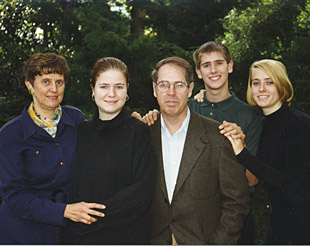
Slowtwitch: Tell us about your father, mother, and sisters – and how your family life shaped you?
Jordan Rapp: My parents have been married for 39 years, which is pretty remarkable. We're a New York family, through and through. My mother is from upstate New York, outside of Albany, and my father is from Manhattan. My father Bill was born January 5, 1939 and is a professor of International Business and Foreign Relations at the New Jersey Institute of Technology in Newark, NJ. It's a small school, and he is able to do a lot of research, which is his passion. He also just graduated from Law School — at age 70! He decided to go to Law School after the 2004 election because he felt that the Bush administration had unfairly used legal loopholes to allow churches and other non-profits to wield political influence which ultimately won the election for them. He was very angry as a result and decided that he needed to understand how to prevent it, so he went to law school. So he added a Juris Doctor to his PhD from Yale and two Masters degrees in Economics, one from Yale and one from Stanford. He LOVES school. He was raised by a single mother and his older sister, as his father passed away when he was only three. He went to Trinity high school in NYC on scholarship and then to Amherst, also on scholarship. He was a very good wrestler and lettered in wrestling both at Trinity and Amherst. He went to Vietnam to advise the US Commerce Department during the war and picked up Judo; he continued to study and is now a 2nd dan (degree) black belt in Judo. His current sporting passion is golf, though. He's admittedly much better at Judo than at golf. In both cases, the length of time it takes to hit a golf ball or to flip someone onto their ass is about as much as he likes to exercise. He's fast-twitch, but he's extremely competitive, and that is where I get my competitive fire. He's also (as you can see by going to law school at age 66) all about following your passion. He doesn't care what I do, as long as I love doing it. He has spent his life doing things because he believed in them (he got a PhD in Economics focusing on Japan when they were still a tiny, fledgling economy and everyone said he was an idiot), often in the face of harsh criticism. So he is really an inspiration with his chase your dreams mentality. He's generally quite reserved, though, and prefers books to people. I think it's because he grew up without a father, so he missed a lot of that guidance. He also loves early classic surf music – like the Ventures.
My mother Diane was born June 23, 1941 and runs a small business helping place students in specialized secondary schools. She does some work with foreign students, but her passion is troubled kids who need programs that will help change their lives for the better. She loves to help other people more than anything, which is probably why I spend so much time on the Slowtwitch forums doling out advice. She is the least competitive person I know, but she's got a lot of natural endurance ability. She swam a mile in the little lake we have a cabin on the day before I was born, 8 and a half months pregnant, and she swam a mile in the middle of summer in a muddy little lake. That tells you pretty much everything you need to know about my mother. Just like my dad, she is the kind of person who will do something specifically because you told her she couldn't or shouldn't. But she comes from a very traditional Northeastern family, so she's definitely old-fashioned in some ways too. She loves classical music.
I have two sisters, both older. Stacy is 36 and lives in Brooklyn, NY. She runs a witchcraft store (seriously) on the Lower East Side of Manhattan called Enchantments, Inc. She has five cats, lots of tattoos, and is a practicing witch. She was never really into sports. She's a fantastic artist, especially with pottery. She smokes, which I hate. We are quite opposite, but also inevitably similar as well.
Christina is 34 and lives in Woodbridge, CT. She is an MD-PhD resident in Ophthalmology at Yale-New Haven hospital. She and her husband Jason – who is an MD-PhD resident in Endocrine Surgery at Yale-New Haven – have two kids, Henry (age 2) and Alexandra (age 7 months). She played sports some in high school, but never really had a passion for it. She was quite a good breaststroker, though. The irony is that she is the one who has four years of high school swimming. She loved the high school swim coach, and I did not (which is why I didn't swim in high school.) We have always been very close. We spent from 1982 – 1989 living in Japan, and my sister and I did everything together. She's much more business savvy than I am. If she were a pro triathlete, she would be like Macca or Jessi Stensland, with lots of sponsors and great deals. She's always been a negotiator. If she wasn't so busy, I'd make her my agent. To give you an example, she regularly buys things on eBay, then immediately resells them with better pictures and descriptions, and she MAKES a lot of money doing so. She's like Midas. She has the golden touch. She loves country music and she loves to shop. She also loves sales and refuses to pay full price for anything.
Christina and my mother have done a few triathlons together. They quite enjoy the Danskin Women's Triathlons.
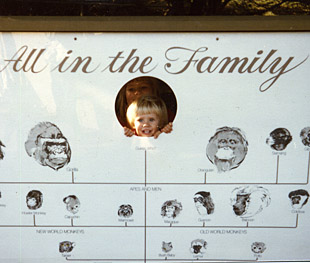
ST: What things did your father and mother teach you – either by persuasion or by example — that had the most lasting impact?
Jordan: They set a standard for excellence that was pretty high, especially regarding education. We were expected to do well – very well – in school. A’s were expected. Anything less was not considered very good. In high school, I considered a B to basically be failing. But they also encouraged me to try new things. I tried a ton of musical instruments (none took) and a ton of sports (everything under the sun). So there was certainly a lot of freedom in that sense. But it also had to be things that they perceived to have value. I would say the most lasting example was the standard they set for excellence. I guess it was the sense that anything worth doing is worth doing well. But they also instilled a sense that certain things were not worth doing. For example, my parents dictated that I would take Latin – I ended up taking seven years of it – because they thought the French and Spanish programs were a joke. I took two years of calculus in high school, which was the result of a placement test in math you took in sixth grade (basically you ended up taking one, two, or three years of algebra depending on how you did, so you could only take calculus your junior and senior year if you started the cycle in seventh grade). I remember taking that test and knowing I had to do well. Both of my sisters took two years, so I was going to take two years. I never knew if I my parents influenced my placing as a result of that test, but it wouldn't surprise me. If there was a top level, that was the level you aspired to. Or you didn't do it.
ST: Where did you grow up? What was it like as a kid?
Jordan: I grew up two places. From age two to nine, I grew up in Tokyo, Japan, but spent summers in a little cabin on a lake about two hours North of New York City. That was really great. Japan is very safe. I took the subway by myself at age six. There was never any worry. The only real holdovers are that I'm quite good with chopsticks and that I love seaweed. In 1989, we moved back to the US, and ended up living about 10 miles away from the city that we'd lived in before we moved, and incidentally about 2 miles from the hospital where I was born. This area was also really nice. It was suburbia, so I didn't really like it too much when I was growing up there. Nothing to do. But after college, I moved back there and realized how great it is for triathlon. My parents live 100 yards from access to 25 miles or so of gravel carriage trails in Rockefeller State Park. And the biking is also very good. But I didn't do any of that stuff as a kid. I played outside some – we had a big yard. But my real passion when I was a kid was radio control cars and animals. I had a LOT of pets. I liked to play in the dirt and stuff. So that was good, but it wasn't a very exciting place to grow up.
ST: What subjects in school were you drawn to?
Jordan: I liked writing a lot. English and writing. My school was very writing intensive. We had an hour of writing every Monday in the afternoons. You were given an assignment and an hour to write an essay. At the end of the hour, you handed it in. I did that basically every week for four years. It makes you a very competent writer. Probably the best thing that school gave me. And I was lucky to go to a very good private school. We had several teachers with PhDs who easily could have taught at colleges. My physics teacher was a PhD research physicist who defected from Russia. He wasn't allowed to teach at universities because of “national security.” He had been quite a famous Russian dissident (his name is Pavel Litvinov; he and Andre Sakharov were very close friends). So he ended up at my high school. I had a great friendship with him, and I took three years of physics, including one year of one-on-one tutoring. I also enjoyed Latin a lot, because it is like engineering a language. It's very systematic. So it combined my love of language with my engineering brain. Generally, I liked school a lot. I would say that I found history to be the most boring, especially European history. And when European history would cross over into English – reading Charles Dickens or Thomas Hardy – I hated that.
In college, I was an engineer, because I knew it was a “useful" degree and because I had a passion for parts of it. But I think it's inevitable that you get burned out when you major in something. So by the end, I really hated engineering. But I always love the classes on structures. I loved to build things, but really what I love is figuring out HOW to build things. And every class I took along those lines was great.
Generally, though, my passion in college was really rowing, and I know that my studies suffered as a result. But that was what I chose to pursue. I sometimes joke that I majored in rowing. I never really found the same passion for learning that I had in high school, I think, because I was so focused on my life at the boathouse.
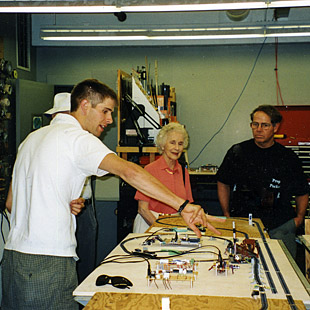
ST: What friends and teachers influenced you and why?
Jordan: I had four teachers that powerfully influenced me. In high school, my Latin teacher – Dr. Adrian Pierce – and my Math teach for three years – Diana Kaplan – most profoundly influenced me. They never let me off the hook. They had very high expectations for me, but they expressed it in a very caring manner. They made me want to learn. And that's when I realized it's less about what you are doing than how you approach it and who you are doing it with. I didn't really love math, but Ms. Kaplan made me love it the way she taught it. I didn't fully realize it until my senior year, when I had a different math teacher, whom I really didn't like, and I disliked math as a result. Dr. Pierce made Latin come alive. She was just a great teacher, with everything that means.
In college, I had one professor who taught a class on structural design. It was the best class I took in the four years that I was there. It wasn't the subject matter, it was the way he taught it. He loved it. And he made us love it. I am sure I will spell his name wrong, but I believe it was professor Zhigang Zhu. I remember the class though, MAE 335 – fluid dynamics. I learned more in that class than I learned in every other class I took, because he taught us HOW to think about the problem. I could have taken that class ten more times and learned something new every time. He was the one who showed me that I could love engineering. He reminds me a lot of Josh Poertner at Zipp. The other professor was Luigi Martinelli. He was my advisor and he is easily one of the smartest people I've ever met. He is doing some of the really defining work in CFD (computational fluid dynamics). His work is what trickles down to define the software “rules” that everyone from Boeing to Specialized uses. But what I realized – right before I graduated – is how accessible he was. He was the first professor who really made me see that he wanted to teach me. I hope I might have the chance to go back and learn more from him, since I didn't take advantage of that opportunity nearly enough.
In and after college, the most influential person in my life was my first real mentor – Gordon Eggleston, who owns the company I worked for over summers in college and then for a year half-days once I decided to pursue triathlon. He runs a vintage & historic race car restoration and maintenance business called Hudson Historics. He was the one who made engineering real for me. All these things that I was studying, he made them come alive in the cars. He taught me to weld, to lathe, to mill, to fabricate, etc. And that was what made me love to build, to think, and to do the hands-on stuff that doesn't get taught enough in college. At least for me. He made engineering something I could touch. And he was always willing to teach. I worked for him for five years, and I don't think he ever turned me down when I asked him to show me how to do something or to explain some concept or way of doing something.
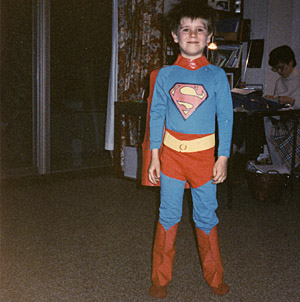
ST: Who, if anyone, from any walk of life, did you admire growing up?
Jordan: I was generally more drawn to things than people. I was attracted to tasks, a subject or a problem. I didn't have any posters of any people on my walls. I would say the one single person that I really remember admiring before college was General William Tecumseh Sherman. Sherman's March through the South really won the Civil War, which is certainly the most important event in US history. I always remember Sherman's quote that "war is hell." There was no sense of the glory or the heroics. His was a dirty business, and he knew it. I also remember his unwillingness to run for president. He was the ultimate pragmatist. He knew what needed to be done, and he did it. That spoke to me. But I don't know that I admired him as much as I really just respected him and appreciated his methods.
I began to admire people more once I got to college and started rowing. Once I became really passionate about sports, I found it easier to admire people and I had heroes in sports. But I didn't really have that same sense of interest in people growing up. As a rower, I admired the really successful rowers. But in many ways, it was simply their athletic achievements that I admired. I knew nothing about them as people – only that they were very good athletes.
I think it's very hard – until you have a real sense of yourself as a complete person — to really admire other people. You end up admiring certain things about them, which really means that you really just wish that you could achieve similar things.
I would say that the first time I've ever really admired someone happened just this past week, when a friend of mine asked me if I knew much about Chuck Yeager. I knew a bit about him, but I've since spent some time reading about him on the Internet. Chuck Yeager is the kind of man I can really admire – as a complete person. But I don't know that I could do that without actually knowing what I now know about myself.


